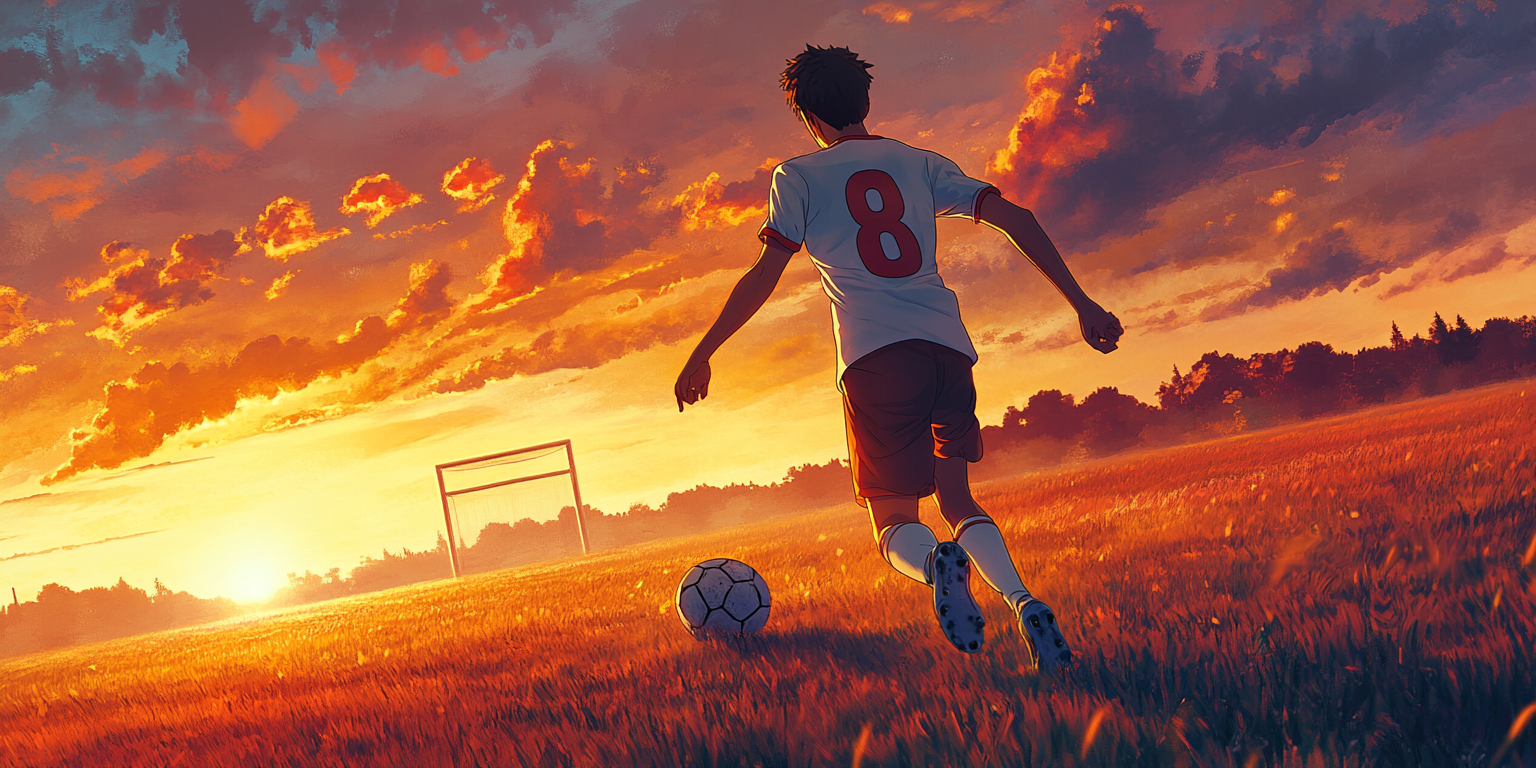How to Get Better at Soccer: 9 Tips You Can Start Today
Becoming a better soccer player isn’t about doing more—it’s about doing what actually matters. Whether you’re a beginner learning the basics, a recreational player looking to play competitively, or a competitive player looking to reach the next level, knowing how to get better at soccer comes down to these main things: talent, game IQ, mindset, athleticism, fitness, recovery, and discipline.
I’ve played soccer ever since I can remember, at different levels of the U.S. soccer pyramid, from club to high school, college club soccer, and amateur/semi-professional levels. I also graduated from San Jose State University with a degree in Kinesiology: Rehab Science, and I am a Certified Personal Trainer, Certified Nutritionist, and soccer coach.
One of my main goals with this website is to share the training knowledge that has helped me become a better player in a shorter amount of time by focusing on improving the right things that actually matter to performance on the field. I’ve also helped players stand out with their teams, earn starting spots, and get a better understanding of how to actually improve on and off the field.
In this blog post, I will go over a complete guide on how to get better at soccer with many practical tips you can start using today.

How Do You Get Better at Soccer?
Becoming a better soccer player requires a holistic approach that combines technical skills development, physical fitness, mental toughness, and recovery. The best soccer players understand that improvement does not come overnight, and instead it comes from practicing consistently over a long period of time.
These nine following tips will give you a complete roadmap for improvement, covering the most important things you need to focus on to see real improvement. Follow these tip, consistently and over a long period of time, and you’ll set yourself up to become a better soccer player at any level.
Build a Real Passion for the Game
Building a real passion for the game is the foundation of your soccer journey because it is what separates a great soccer player from an average player. When you truly love and enjoy the game, training sessions become something you want to do rather than something you have to do, and you’ll naturally find yourself taking the right steps to make time for training.
Passion fuels discipline, keeps you motivated during tough times, and helps you stay committed to your long-term goals, even when progress feels slow. The more connected you are to the sport, the more likely you are to put in the conscious effort to improve daily, weekly, and yearly by analyzing all of the actions you take every day.
Develop Discipline and a Consistent Practice Routine
Discipline and consistency are what separate players who plateau from those who continuously take action towards reaching their goals instead of leaving their goals as wishes. A structured training schedule should include training sessions with a team at least 2-3 times per week, 2-3 days of unstructured play per week, as well as time for athletic development work, injury prevention, and recovery.
The key to practicing consistently is showing up even when motivation is low and understanding that regular practice with a proper plan gives better results than random intense training sessions. Small wins from consistent practice compound over time, transforming you into a better soccer player in a faster time.
Train Smarter, Not Harder, and Find Your Talent
To do the right things on and off the field means to train smarter not harder. Training smarter means maximizing your development by focusing on quality over quantity and improving everything that affects performance on and off the field.
This is much different from mindlessly working hard for the sake of working hard without a plan. On the pitch, smart training involves practicing consistently with game-like scenarios, training at match speed, and using other training methods like barefoot training.
Off the field, smart training is made up of the right athletic training, injury prevention work, and optimizing your sleep, nutrition, hydration, EMF exposure, and overall recovery. By taking care of these areas, you create the foundation needed to fully tap into your unique strengths and abilities, which makes it easier to find your talent.
Every single player has unique strengths and abilities based on their physical and mental attributes and playing style that make them special on the field. Your job as a developing soccer player is to experiment with different playing styles, positions, and roles to discover what you do best, then build your game around that core strength while still improving other skills of the game.
To find your talent, expose yourself to as many variations of the game, compete against different levels of opposition, analyze footage, and actively seek feedback from coaches and teammates who can observe your performance objectively. Once you identify your standout traits, sharpen these skills like a weapon and let them become your trademark on the field.
Master the Basic Skills of the Game
Although you need to be really good at a few skills to stand out, which is your talent, you also need to have a strong foundation in all the other skills of the game.
- Ball control
- First touch
- Passing
- Dribbling
- Shooting
- Defending
- Developing your weaker foot
- Awareness
- Decision making
- Composure
- Creativity
- Game IQ
Focused training on these fundamental skills through team training, small-sided games, and solo training drills will give you a strong base / foundation as a soccer player.
Play in Different Environments and Formats
The best way to improve at the game is to play the game. This means playing regularly and exposing yourself to different game formats that challenge different aspects of the game, such as:
- Small-sided games
- Futsal
- Beach soccer
- Soccer tennis
- Soccer ping pong
All of these variations will help develop your technical skills, quick decision-making, composure under pressure, and ability to play in tight spaces with limited touches. Also playing on different surfaces, in various weather conditions, and against players of different skill levels, from recreational pickup games to competitive games, will help you be better able to play in any environment.
Improve your Mental Toughness
Mental toughness is another trait that separates great players from good one. Developing mental resilience involves setting both short-term goals and long-term goals while tracking your progress to stay motivated through the inevitable ups and downs of soccer.
Train your mind like you train your body through visualization, meditation, journaling, reading, positive self-talk and positive body language, because the players who stay mentally strong are the ones who rise when the pressure is highest and can maintain peak performance throughout an entire match.
Improve your Physical Fitness and Athleticism
The best way to develop fitness and athleticism as a soccer player is to play the game a lot, spend time training barefoot, play multiple sports, and focus on optimizing your fascia system and breathing mechanics. Your fascia is the connective tissue that covers your entire body and stores the elastic energy required for running, kicking, and every other skill you perform on the soccer field.
Your goal as a soccer player should be to become a more “fascia-driven athlete” which all top athletes already are consciously or subconsciously. Along with improving your athleticism comes developing proper breathing mechanics because your movement and breath are directly linked together.
This means that learning how to breathe efficiently through your nose and diaphragm will help improve your athleticism and vice versa. Along with athleticism you also have to be in shape and have high fitness because soccer is a demanding sport where the most talented and fittest players usually always stand out.
Prioritize Every Aspect of Recovery
Recovery is just as important as all of the training you do because it’s during rest periods that your body adapts, strengthens, and prepares for the next training session or match. Basic recovery techniques include:
- Sleep
- Proper hydration
- Proper nutrition
- Protection from EMF exposure
- Grounding therapy
Advanced recovery techniques involve things like:
- Active recovery through light movement
- Myofascia release massage
- Breathing exercises
- Red light therapy
- Cold/hot therapy
- Sauna therapy
Smart recovery also means listening to your body, managing training intensity to avoid burnout, and understanding that sometimes doing less allows you to train harder when it matters most.
Learn from Coaches, Professional Players, Teammates, and Opponents
As a player even though you learn a lot by spending time alone with the ball, you learn more from the experiences and feedback from others. The fastest path to improvement comes from actively seeking knowledge and feedback from everyone around you in the soccer community because each person offers unique insights that can accelerate your development.
Your coaches provide structured guidance, tactical understanding, and technical corrections that can fix weak points in your game you might not have even realized. Your teammates also help you improve because you learn from how they act and perform in training and games.
You can also learn by watching professional matches and analyzing players in your position, whether that is a live game or from the television. And you can even learn from your opponents, such as by observing how they play, what works against you and your teammates, and how they solve problems on the field.

Final Thoughts
To summarize, becoming a better soccer player is not about doing everything at once, it’s about focusing on the right things, practicing consistently, and staying committed over a long period of time. Whether it’s building a real passion for the game, mastering basic and advanced skills, improving your physical fitness, or developing mental toughness, each step you take compounds to make you a more complete player.
The nine tips in this guide give you a practical framework for long-term growth, but the real progress comes from taking action and applying them consistently over the year. If you commit to these tips you’ll not only get better at soccer, but you’ll enjoy the game more than ever.
Frequently Asked Questions
What gear and equipment are needed to improve my soccer skills?
The best thing about soccer is that you don’t need a lot of equipment and accessories to start playing and improving. All you really need is a soccer ball, but the more serious you want to play, the more gear you will need, such as soccer cleats, shin guards, socks, shorts, and shirts, and soccer equipment, such as cones, rebounders, ball pumps, soccer bags, etc.
How do I improve my soccer skills?
To improve your soccer skills, focus on playing the game and its variations as much as possible while dedicating time to mastering fundamental skills like ball control, passing, shooting, dribbling, defending, etc. Combine regular team training with solo soccer drills, small-sided games, and learning from the feedback of coaches, teammates, and professional matches to speed up your progress and follow this guide to have a more comprehensive plan.
How often should I train to get better at soccer?
To improve at soccer, you always have to be “training,” which means you’re either improving technically, mentally, physically, or spiritually because everything you do on and off the field impacts your performance and recovery. Training with the ball should be done a minimum of 3-4 times a week and should include team practice sessions, unstructured play like pickup games or small-sided games, and individual skill work.

